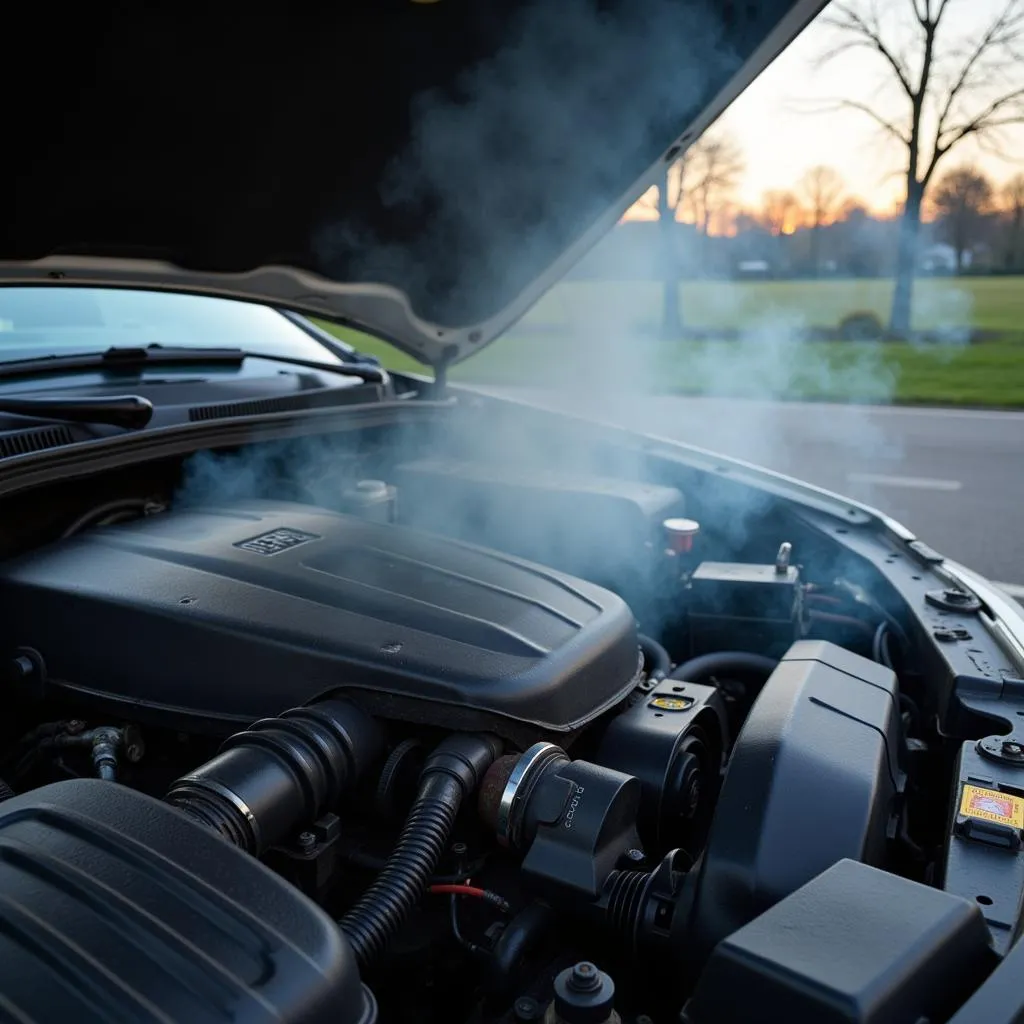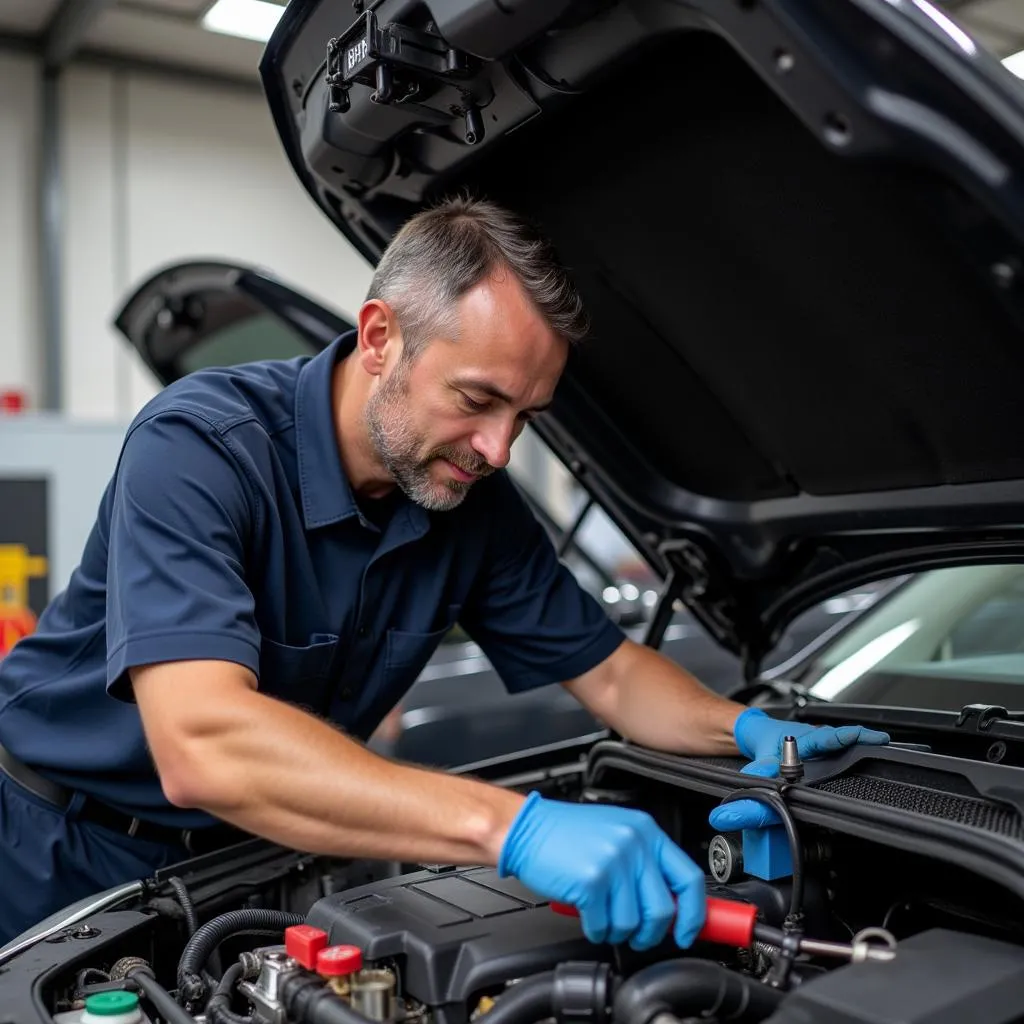A Heat Soaked Car can be a real pain, especially during those scorching summer months. But what does it actually mean? In simple terms, a heat soaked car is a vehicle experiencing performance issues due to excessive heat buildup in its engine and components. This can lead to a range of problems, from reduced power and fuel efficiency to difficulty starting and even potential damage to your car’s engine.
 Overheated car engine
Overheated car engine
What Causes a Heat Soaked Car?
Several factors can contribute to a car becoming heat soaked. Some of the most common include:
- High Ambient Temperatures: This is the most obvious culprit. When temperatures soar, your car’s cooling system has to work overtime to keep things cool.
- Prolonged Idling: Letting your car idle for extended periods, especially in hot weather, can cause heat to build up in the engine bay.
- Aggressive Driving: Putting your car through its paces with hard acceleration and braking generates a lot of heat.
- Cooling System Problems: A malfunctioning cooling system, such as a low coolant level, a faulty thermostat, or a failing water pump, can prevent your car from effectively dissipating heat.
Recognizing the Symptoms of a Heat Soaked Car
It’s crucial to recognize the signs of a heat soaked car to prevent potential damage. Keep an eye out for:
- Decreased Engine Performance: You might notice a loss of power, particularly during acceleration.
- Rough Idling: The engine might sound rough or shaky when idling.
- Overheating Warning Light: This is a sure sign that your engine is running too hot.
- Burning Smell: An unusual burning smell could indicate overheating engine components.
- Steam or Smoke: Seeing steam or smoke coming from under the hood is a serious warning sign and requires immediate attention.
Dealing with a Heat Soaked Car
If you find yourself with a heat soaked car, here’s what you can do:
- Find a Safe Place to Stop: Pull over as soon as it’s safe to do so. Continuing to drive a severely overheated car can cause significant engine damage.
- Turn Off the Engine: Shutting off the engine gives it a chance to cool down.
- Allow the Car to Cool: Let the car cool for at least 30 minutes to an hour before opening the hood. Be extremely cautious when opening the hood, as hot coolant can cause severe burns.
- Check the Coolant Level: Once the engine is cool, carefully check the coolant level. If it’s low, top it off with a 50/50 mixture of coolant and water.
- Call for Assistance: If the problem persists or you suspect an issue with the cooling system, it’s best to call a qualified mechanic.
 Mechanic inspecting a car engine
Mechanic inspecting a car engine
Preventing a Heat Soaked Car
Prevention is always better than cure. Here are some tips to keep your car from becoming heat soaked:
- Regular Maintenance: Ensure your car receives regular maintenance, including oil changes, coolant flushes, and cooling system inspections.
- Park in the Shade: Whenever possible, park your car in the shade, especially on hot days.
- Use a Sunshade: Using a sunshade on your windshield can help reflect sunlight and reduce heat buildup inside the car.
- Avoid Prolonged Idling: Don’t let your car idle for extended periods, especially in hot weather.
- Monitor the Temperature Gauge: Keep an eye on the temperature gauge while driving and address any signs of overheating promptly.
“Regular car maintenance is essential,” says John Smith, Senior Automotive Technician at XYZ Auto Repair, “but it becomes even more crucial during warmer months. Simple checks, like ensuring your coolant levels are topped up and your cooling system is functioning correctly, can prevent a world of trouble.”
Frequently Asked Questions about Heat Soaked Cars
Q: Can a heat soaked car damage the engine?
A: Yes, a severely heat soaked car can lead to serious engine damage, including warped cylinder heads, blown head gaskets, and even engine seizure.
Q: How long does it take for a heat soaked car to cool down?
A: It can take anywhere from 30 minutes to an hour for a heat soaked car to cool down sufficiently.
Q: Can I add water to my coolant if it’s low?
A: While you can add water in an emergency, it’s always best to use a 50/50 mixture of coolant and water.
Q: How often should I check my coolant level?
A: It’s a good idea to check your coolant level at least once a month.
Conclusion
Dealing with a heat soaked car can be a frustrating experience. However, understanding the causes, recognizing the symptoms, and knowing how to prevent and address the issue can save you from potential headaches and costly repairs. Regular car maintenance and proactive measures are key to keeping your car cool and running smoothly, even on the hottest days. If you’re experiencing any persistent issues with your vehicle overheating, it’s best to consult a qualified mechanic to ensure your car stays in top condition.
For those looking for durable and high-quality floor mats to protect their car interiors, check out our range of club car precedent floor mats. And if you’re curious about cars with unique designs, take a look at our article on car no hood for some interesting insights.
Don’t hesitate to contact us on WhatsApp: +1(641)206-8880, Email: [email protected] or visit us at 276 Reock St, City of Orange, NJ 07050, United States if you need any assistance. Our customer support team is available 24/7 to help you with any car-related queries or concerns.
